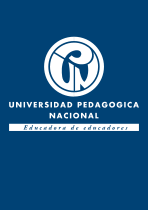La educación científica del siglo XXI: retos y desafíos para los maestros de ciencias naturales.

Citación
Fecha
2017-12-12Autor
Mira Moreno, Elizabeth Cristina
Pérez Pino, María Alejandra
Enlace al recurso
http://revistas.pedagogica.edu.co/index.php/bio-grafia/article/view/7117Metadatos
Mostrar el registro completo del ítemResumen
La enseñanza de las ciencias naturales actualmente requiere responder a las dinámicas cambiantes de la sociedad, de la escuela y de los estudiantes, por esta razón se propone seguir los parámetros de la educación científica incluyente que rompa con los estándares tradicionales y elitistas, donde a su vez se aborden problemáticas de índole ambiental, se haga buen uso de las nuevas tecnologías y se piense críticamente acerca de lo que implica el desarrollo y avance científico; no obstante, llevar a cabo esta perspectiva de educación, requiere un maestro que se apropie de sus saberes profesionales docentes para contribuir a la creación de escenarios en el aula de clase, que conlleven a la formación de un sujeto íntegro. Estos saberes pueden provenir de diferentes fuentes, como los estudios realizados, su práctica pedagógica y sus experiencias personales, aún así es imprescindible reconocer las dinámicas escolares como aquellas que permiten que el maestro visibilice, invisibilice, o resignifique esos saberes para generar un proceso de enseñanza donde se fomente la verdadera apropiación de la cultura científica y por tanto, el actuar racionalmente frente a las diversas situaciones sociales. Esto último, posiciona al maestro como un sujeto activo en el aula, capaz de dinamizar, gestionar, tomar decisiones y actuar en coherencia frente a las necesidades del contexto escolar.
Abstract
The teaching of the natural sciences requires today responds to the changing dynamics of society, school and students, for this reason it is proposed to follow the parameters of scientific education inclusion that breaks with traditional and elitist standards, where Instead, environmental issues will be addressed, new technologies will be put to good use and people will think critically about the implications of scientific development and progress; However, carrying out this perspective of education requires a teacher who appropriates his / her professional teaching knowledge to contribute to the creation of scenarios in the classroom, which lead to the formation of an integral subject. These knowledges can come from different sources, such as studies, pedagogical practice and personal experiences, it is still necessary to recognize the school dynamics as those that allow the teacher to visibility, invisibility, or resignify these knowledge to generate a teaching process where the true appropriation of the scientific culture is fomented and therefore, to actrationally before the diverse social situations. The latter positions the teacher as an active subject in the classroom, capable of dynamising, managing, making decisions and acting in a coherent manner in response to the needs of the school context.
Editorial
Editorial Universidad Pedagógica Nacional
